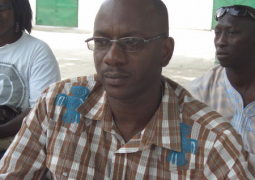The three-day training activity was held at Jokadou Darsilami village in the North Bank Region.
Speaking on the occasion, Ba Ansu Fofana, programme officer of AFES, said creating public awareness on the protection and preservation of forest resources from over-exploitation would strengthen public awareness on environmental issues.
He said the training course would expose participants on environmental protection, social mobilization techniques, forest and the concept of community forestry and its importance, wildlife conservation and biodiversity.
He cited the planting of mangroves in the coastal wetland areas of Dasilami, Bakang and Karantaba in Jokadou, and the importance of soil and climate conditions for better performance of plants.
The AFES program officer said the initiative would complement the efforts of combating climate change and boost food security and poverty reduction.
Kebba Kamu Fofana, alkalo and Alhaji Fakebba Fofana, community elder in Dasilami, praised the organizers for strengthening the capacity of the three communities on environmental issues.
Aja Marokey Gassama, women’s leader in Dasilami, said community participation in the protection of the environment calls for the concerted efforts of all, and declared women’s full support for the initiatives.
The national coordinator of AFES lauded the efforts of the beneficiary communities, for the outstanding support and cooperation in the regeneration and restoration of the forest cover.
Faburama Fofana was speaking on Sunday in Jokadou Dasilami village in the North Bank Region at the end of three-day training programme on environmental education for the communities of Karantaba, Bakang and Dasilami.
The coordinator called on the beneficiary communities to be proactive in the protection and preservation of natural resources, so as to boost food security and sustainable livelihood development.
He thanked UNDP’s GEF for the support in strengthen public awareness on environmental issues.
Sarjo Manneh of the Department of Parks and Wildlife noted that building community awareness on environmental issues would contribute to the restoration of the lost forest cover, biodiversity and breeding of wildlife.
The representative of the department expressed concern about lost biodiversity and disappearance of wild animals.
Lamin Jarjue, NEA regional programme officer, reminded people about anti-littering and illegal dumping laws and regulations, noting that his agency would prosecute anyone found violating the law.
He said the management of the environment calls for concerted efforts in analyzing and disseminating information on the environment, and publishing periodic reports.
Jarjue said his office attaches great importance on the monthly environment cleansing exercise, to halt improper use of farm equipment, chemicals and waste management, and illegal sand mining to avoid blocking waterways.
Ebou Janha, the regional forestry officer, dilated on the importance of forest policy in empowering the community to manage 30 per cent of the total land surface to be put under forest.
He said empowering communities would contribute 75 per cent to be managed by the people.
RFO Janha reminded the people of the need to create fire belts around settlements and other forest resources to protect them from bushfires.
He also called on the people of Dasilami, Karantaba and Bakang to be vigilant in combatting illegal logging.
Other speakers included Mai Sanyang, a village health worker, Karantaba and Sutung Fadera of Bakang, who thanked the organizers for building their understanding on environmental issues.
The women launched an appeal for development partners to support women with a rice and coos milling machine.
The communities’ representatives noted that the skills learnt would mitigate the effects of climate change.
Fishermen noted that lost mangrove in the areas has contributed to low seafood and income, and promised to support communities in the regeneration of mangrove to mitigate the effects of the climate change.


